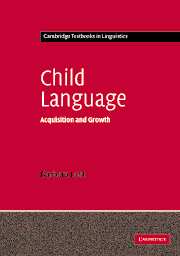Book contents
- Frontmatter
- Contents
- List of figures
- List of tables
- Preface
- Acknowledgements
- 1 The Growth of language
- 2 What is acquired?
- 3 What is the problem of language acquisition?
- 4 How we can construct a theory of language acquisition
- 5 Brain and language development
- 6 The nature of nurture
- 7 How can we tell what children know? Methods for the study of language acquisition
- 8 The acquisition of phonology
- 9 The acquisition of syntax
- 10 The acquisition of semantics
- 11 On the nature of language growth
- 12 Conclusions: toward an integrated theory of language acquisition
- Appendices
- 1 Developmental milestones in motor and language development (adapted from Lenneberg 1967)
- 2a Developmental milestones in infant speech perception
- 2b Examples of sound distinctions perceived by infants
- 3 Developmental milestones in infant speech production
- 4 Developmental milestones in infant syntax: perception
- 5 Developmental milestones in infant syntax: production
- 6 Developmental milestones in infant semantics
- 7 Abbreviations and notations
- Glossary
- References
- Author index
- Subject index
4 - How we can construct a theory of language acquisition
Published online by Cambridge University Press: 05 June 2012
- Frontmatter
- Contents
- List of figures
- List of tables
- Preface
- Acknowledgements
- 1 The Growth of language
- 2 What is acquired?
- 3 What is the problem of language acquisition?
- 4 How we can construct a theory of language acquisition
- 5 Brain and language development
- 6 The nature of nurture
- 7 How can we tell what children know? Methods for the study of language acquisition
- 8 The acquisition of phonology
- 9 The acquisition of syntax
- 10 The acquisition of semantics
- 11 On the nature of language growth
- 12 Conclusions: toward an integrated theory of language acquisition
- Appendices
- 1 Developmental milestones in motor and language development (adapted from Lenneberg 1967)
- 2a Developmental milestones in infant speech perception
- 2b Examples of sound distinctions perceived by infants
- 3 Developmental milestones in infant speech production
- 4 Developmental milestones in infant syntax: perception
- 5 Developmental milestones in infant syntax: production
- 6 Developmental milestones in infant semantics
- 7 Abbreviations and notations
- Glossary
- References
- Author index
- Subject index
Summary
Approaches to the study of language acquisition differ in their fundamental epistemological assumptions. These assumptions underlie the choice of which questions researchers ask, and which methodologies they choose. Approaches may provide (a) developmental descriptions, such as in the research paradigm initiated by Roger Brown at Harvard (1973b), (b) formal logical or mathematical analyses of the language acquisition problem, (c) computational modeling of various language acquisition behaviors, or (d) psycholinguistic studies of language acquisition led by specific hypotheses derived from linguistic theory. The tensions reflected here have interested philosophers for many centuries.
Theoretical approaches to the study of language acquisition
Classical approaches to epistemology
Table 4.1 summarizes basic properties of two classically opposed approaches to the representation and acquisition of knowledge. They differ in their views of: (a) the ultimate source of knowledge (either external and led by environmental input or internal, led by the structure of the mind); (b) mechanisms of acquisition; (c) characteristics of the Initial State, i.e., whether or not innate “knowledge” of some form exists. A rationalist perspective proposes some innate competence (thus the term “nativist” is often used). In a classical empiricist paradigm, “learning” based on input explains all knowledge; the Initial State therefore is a tabula rasa. (See Wilson 1999 for overview.)
- Type
- Chapter
- Information
- Child LanguageAcquisition and Growth, pp. 49 - 72Publisher: Cambridge University PressPrint publication year: 2006



